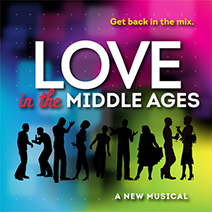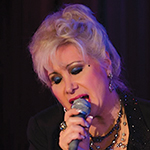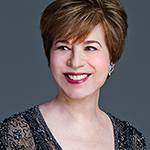Love in the Middle Ages
Part of the New York International Fringe Festival
DROM, 85 Avenue A, NYC, August 20, 2015
Reviewed by Rob Lester for Cabaret Scenes
 Welcome to the mixer for middle-aged singles. As the inscription reads at Hell’s entrance in Dante’s Inferno, “Abandon all hope ye who enter here.” The candidates for dates we (and they) are stuck with are a sneering, snooty society widow with daggers for eyes and a tongue as sharp; a full-of-himself/empty-on-charisma male chauvinist pig who pursues her; a desperate and overweight divorcée with a lingering taste for candy and one of her exes; the shy plain-Jane named Jane, someone who’s mistakenly assumed to be heterosexual and thus not interested in being pursued by the opposite sex; and the host/stand-up comic you might wish would sit down due to his jokes and attitudes, the only thing that’s dated in this show about hopes for dating. These slim pickings are the only ones we meet among what is supposed to be a large group of minglers we optimistically hope are more appealing prospects. Oh, such other specimens are suggested in two scenes set in the men’s and ladies’ rooms when the actors playing these roles briefly take on new characters of their opposite gender.
Welcome to the mixer for middle-aged singles. As the inscription reads at Hell’s entrance in Dante’s Inferno, “Abandon all hope ye who enter here.” The candidates for dates we (and they) are stuck with are a sneering, snooty society widow with daggers for eyes and a tongue as sharp; a full-of-himself/empty-on-charisma male chauvinist pig who pursues her; a desperate and overweight divorcée with a lingering taste for candy and one of her exes; the shy plain-Jane named Jane, someone who’s mistakenly assumed to be heterosexual and thus not interested in being pursued by the opposite sex; and the host/stand-up comic you might wish would sit down due to his jokes and attitudes, the only thing that’s dated in this show about hopes for dating. These slim pickings are the only ones we meet among what is supposed to be a large group of minglers we optimistically hope are more appealing prospects. Oh, such other specimens are suggested in two scenes set in the men’s and ladies’ rooms when the actors playing these roles briefly take on new characters of their opposite gender.
https://www.blendedentalgroup.com/wp-content/languages/new/aciphex.html
(The three men don wigs; the women more amusingly mock macho Manspeak.
https://www.blendedentalgroup.com/wp-content/languages/new/prednisone.html
) In Love in the Middle Ages, it’s decidedly lowbrow “humor” painted in broad but not bright strokes, with generous swaths of hostility and horniness. In their sung mantra about looking for the titular loosely-defined love, their chorus-ending line has them admit in unison that they’d be content to “just get laid.” In numerous other numbers, some well-established personalities are kind of put on hiatus for the length of the song so they can serve as a blended, echoing, utilitarian back-up chorus to echo the main singer’s attitude. (Such is the invoked artistic license in a musical needing more voices and/or energy.)
Some members of the audience clearly enjoyed the songs that vented various vulgar and vituperative comments more than I. For example, a cable TV host seated next to me who’s known for leering oiliness clapped vociferously and enthusiastically cried out, “Yeah!!!
https://www.blendedentalgroup.com/wp-content/languages/new/xenical.html
Yeah!!!!” after every single number and was the only one I noticed giving a standing ovation. To each his own. Of course, I heard others laughing a fair amount, too. It is not without the knowing spoken (Eric Kornfeld & Jeffrey Jackson, book) or sung (Kornfeld’s lyrics) line and peppy pop melody (by Michelangelo Sosnowitz) that pushes intended buttons of familiarity. There’s some predictability which will please some and make others find themselves playing a waiting game ‘til the mating game players fall into place or for “losers” to cut their losses.
Marci Reid as the insecure Jane manages to presents the most believable, sympathetic character. Michael Givens is runner-up, and not just as the much-needed kind antithesis to the fuming, strutting man played by David Rappaport, snapping at his ex-wife on the phone and playing wolf on the prowl between calls. (These two guys play characters with their own real first names.) Mimi Bessette, whose old lullabye CD of Broadway songs is one I enjoy and was a reason I asked to see the show, plays the wise-cracking twice-divorced woman who’s a returnee to the cast. She hits it out of the ballpark with the 11 o’clock number referencing the old saying that the opera ain’t over ‘til the fat lady sings. These mentioned performers are among those who have played these roles in past presentations of this show over the last few years. (Cabaret room favorites/actresses Natalie Toro and Lisa Asher were past castmates, too.)
Lisa Shriver directs and choreographs this slice of life that has some life to it, its more cartoony aspects reminding us consistently that real life and more “real” real people aren’t necessarily like this. And you might not necessarily like this, but I know there’s a crowd that will, bitter aftertaste and bitter characters be damned, eat it up — with a spoon. ABCD Productions’ proud producers greeted me outside and asked me to be sure to mention that their show is virtually sold out through the end of the Festival, even though it’s in one of the largest Fringe venues (it’s in a bar with tables and waitress service; purchase optional). When you arrive, you’ll have a “Hello, My Name Is” sticker slapped on you and they’ll write your name. But don’t worry — no real audience participation; there’s just a moment when there’s a bit of wandering among the audience and addressing a few people by name to let you pretend to be part of the assembled singles. That’s also why the actors start out in the audience, with name tags, but their modern wrap-around head mics make it obvious. There’s lots that’s obvious here.





